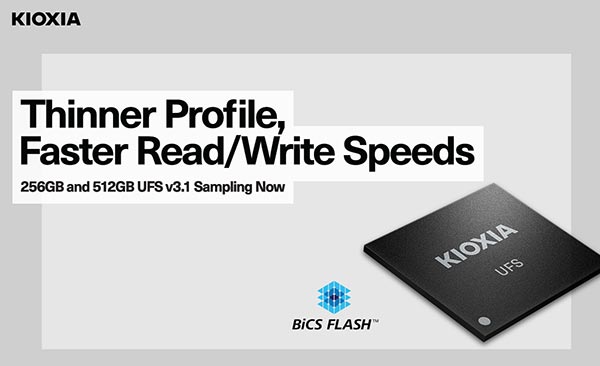 KIOXIA Europe GmbH, a world leader in memory solutions, today announced the launch of Universal Flash Storage (UFS) Ver. 3.1[1] embedded flash memory devices utilizing the company’s innovative 4-bit per cell quad-level-cell (QLC) technology. For applications needing high density, such as cutting-edge smartphones, KIOXIA’s QLC technology enables the capability to achieve the highest densities available in a single package.
KIOXIA Europe GmbH, a world leader in memory solutions, today announced the launch of Universal Flash Storage (UFS) Ver. 3.1[1] embedded flash memory devices utilizing the company’s innovative 4-bit per cell quad-level-cell (QLC) technology. For applications needing high density, such as cutting-edge smartphones, KIOXIA’s QLC technology enables the capability to achieve the highest densities available in a single package.
KIOXIA’s UFS proof of concept (PoC) device is a 512 gigabyte prototype that utilizes the company’s 1 terabit (128 gigabyte) BiCS FLASH 3D flash memory with QLC technology. The PoC device is designed to meet the increasing performance and density requirements of mobile applications driven by higher resolution images, 5G networks, 4K plus video and the like.
“KIOXIA has been an inventor and leading supplier of UFS memory since 2013. Since that time, we focus on expanding our already broad lineup with new UFS Memory products for applications that demand superior interface performance,” noted Axel Stoermann, Vice President Memory Marketing & Engineering, KIOXIA Europe GmbH. “With QLC UFS we can offer another solution which will meet the increasing requirements for Flash memory devices,” he continues.
KIOXIA is now sampling its 512 Gigabyte QLC UFS PoC devices to select OEM customers.
Notes
[1] Universal Flash Storage (UFS) is a product category for a class of embedded memory products built to the JEDEC UFS standard specification. UFS uses a serial interface having an advantage of full duplex and simultaneous communication of read/write with its host device.
The samples are POC devices under development and have some feature limitations. Furthermore, specifications of the devices are subject to change without prior notice.
In every mention of a KIOXIA product: Product density is identified based on the density of memory chip(s) within the Product, not the amount of memory capacity available for data storage by the end user. Consumer-usable capacity will be less due to overhead data areas, formatting, bad blocks, and other constraints, and may also vary based on the host device and application. For details, please refer to applicable product specifications.
All company names, product names and service names may be trademarks of their respective companies.


